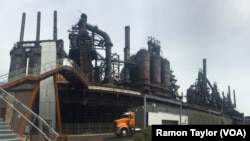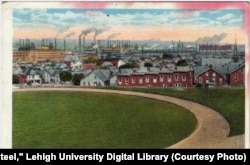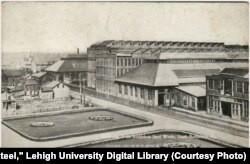Richard Check labored for 43 years, five months and 15 days as a rigger in eastern Pennsylvania’s Bethlehem Steel, formerly the second largest steel corporation in the United States.
In his final 4½ years on the job, he was working 12 hours a day, every day, as the company tried to keep his division going. By 1994, the work had taken a toll on his body.
“All I was doing was eating, sleeping, going to work, and going to the toilet,” said Check.
Check retired from Bethlehem Steel shortly before it filed for bankruptcy and closed its doors for good, nearly 150 years after its founding.
The experience honed Check's political views, turning him into a strong union supporter, even though he had some grievances with the United Steelworkers union that negotiated on his behalf.
“If you didn’t have a union today … you wouldn’t even get minimum wage, like my father. When he started in 1910 — 12 cents per hour,” said Check.
‘Outsider’ appeal
Labor union rights remain a top priority for former steel and manufacturing workers across the nation. In Bethlehem, it’s an issue that transcends party lines among former steelworkers.
“When I worked in the plants, Republicans would come right out in the open and say, ‘I vote Republican.’ But the first thing out of their mouth after they would say that [was], ‘I would never work here at Bethlehem Steel if there wasn’t a union,” said Frank Behum, a fourth-and-last-generation employee of Bethlehem Steel, where he worked for 32 years.
“They were Republicans that were smart enough to know, because of safety reasons, you couldn’t afford to follow the [anti-union] edicts of the Republican Party. You had to look to the Democrats to save your butt,” he added.
But this year’s election may be different.
Lester Clore, a 33-year veteran of the Bethlehem plant, says Republican Donald Trump’s talk of bringing back jobs from overseas and Democrat Bernie Sanders’ platform to ensure fair wages for its workers are both attractive to many of his friends.
“We like some of the things that Trump is saying, [and] some of the things that Bernie Sanders is saying,” Clore said. “But we’re smart enough to know that we can be being played, too.”
Preying on fear
The problem, Clore adds, is he doesn’t believe either candidate has the “nuts and bolts” to follow up on their campaign promises — one of the reasons he is likely going to vote for former secretary of state Hillary Clinton this election.
"Here’s a guy [Trump] who advocates that he’s pro-union, yet he can’t deal with his own workers down at the casino," said Clore. "They’re on strike, and he can’t seem to sit down and negotiate a fair agreement with them."
Behum, who supports Sanders for president, says he, too, encounters folks who plan to vote for Trump, but feels his ideas prey upon people’s fears that politicians ultimately help themselves -- not their constituents. “They know the politicians don’t listen to the electorate, they only listen to the banks."
Ted Morgan, professor of political science at Bethlehem's Lehigh University, senses that part of Trump's and Sanders’ appeal with ex-steelworkers has arisen out of frustration with past administrations’ inability to improve their lives.
“They do feel like outsiders, understandably,” said Morgan. “Just as past candidates — from [former president Ronald] Reagan on — ran ‘against government’ and pulled some of their loyalties, contemporary ‘outsider’ sounding candidates still pull their support.”
Steelworker community
Post-bankruptcy, part of the ex-Bethlehem steelworker community went on to find jobs at other steel plants, but others weren’t so lucky — a factor, Morgan says, that plays into their dissatisfaction.
“My guess is that those with a strong pro-union feeling would be inclined to be in Bernie's camp, while those perhaps more widely alienated might go to Trump,” said Morgan.
Similar to union rights, many ex-steel and manufacturing workers in Bethlehem take a firm stance on free trade agreements.
They were largely opposed to NAFTA – The North American Free Trade Agreement – when it was signed into law by former president Bill Clinton in 1994, and are opposed to the Trans-Pacific Partnership (TTP) today.
“Manufacturing workers and union members – they’re very aware of the role that these free trade agreements have played in moving manufacturing and unionized jobs overseas,” said Jill Schennum, a cultural anthropologist and board member of Steelworkers Archives, a nonprofit organization that collects oral histories and provides educational outreach regarding the Bethlehem Steel plant.
Skill set
Unlike other areas of the country, Schennum said, the economy of Bethlehem has seen a revival. But its now prominent warehousing and service sectors require a separate set of skills, which she says do not provide many of the same benefits as manufacturing.
“Those warehouse jobs aren’t the same as steel jobs. They average about $13 an hour; they are mostly non-union jobs,” she said. “Many warehouses in this area employ people on temporary contracts and don’t even hire them directly.”
Despite past disappointments and the uncertainty that lies ahead for future generations – for residents Richard Check, Frank Behum and Lester Clore – Bethlehem will always remain home.
"Bethlehem was a great place. It still is a great place,” said Clore. “It would be an even better place if they had the manufacturing jobs back.”









